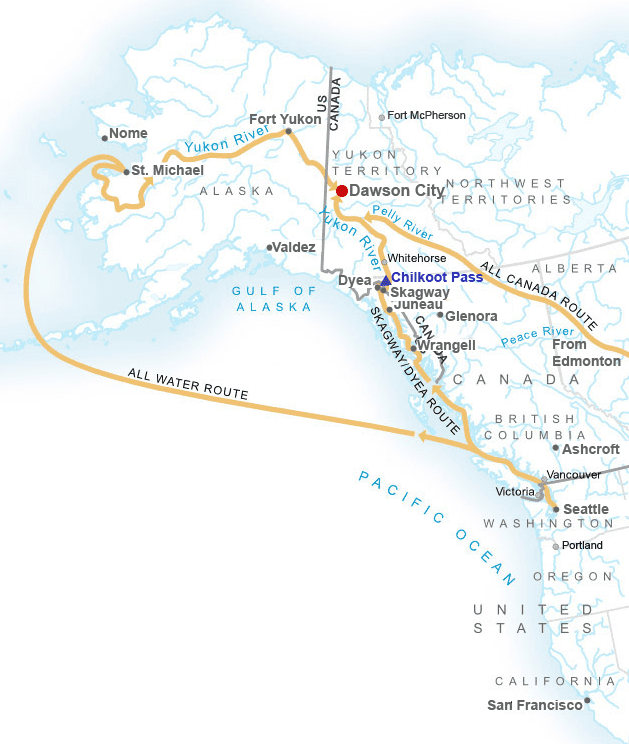By Mona Hatfield

FROM WIKIPEDIA COMMONS
The Klondike Gold Rush was a migration by an estimated 100,000 prospectors to the Klondike region of Yukon, in north-western Canada, between 1896 and 1899. Gold was discovered there by local miners on August 16, 1896; when news reached Seattle and San Francisco the following year, it triggered a stampede of prospectors. Some became wealthy, but the majority went in vain. It has been immortalized in films, literature, and photographs.
To reach the gold fields, most prospectors took the route through the ports of Dyea and Skagway, in Southeast Alaska. Here, the “Klondikers” could follow either the Chilkoot or the White Pass trails to the Yukon River, and sail down to the Klondike. The Canadian authorities required each of them to bring a year’s supply of food, in order to prevent starvation. In all, the Klondikers’ equipment weighed close to a ton, which most carried themselves, in stages. Performing this task, and contending with the mountainous terrain and cold climate, meant those who persisted did not arrive until summer 1898. Once there, they found few opportunities, and many left disappointed.
To accommodate the prospectors, boom towns sprang up along the routes. At their terminus, Dawson City was founded at the confluence of the Klondike and Yukon rivers. From a population of 500 in 1896, the town grew to house approximately 30,000 people by summer 1898. Built of wood, isolated, and unsanitary, Dawson suffered from fires, high prices, and epidemics. Despite this, the wealthiest prospectors spent extravagantly, gambling and drinking in the saloons. The indigenous Hän, on the other hand, suffered from the rush; they were forcibly moved into a reserve to make way for the Klondikers, and many died.
Beginning in 1898, the newspapers that had encouraged so many to travel to the Klondike lost interest in it. In the summer of 1899, gold was discovered around Nome in west Alaska, and many prospectors left the Klondike for the new goldfields, marking the end of the Klondike Rush. The boom towns declined, and the population of Dawson City fell. Gold mining production in the Klondike peaked in 1903 after heavier equipment was brought in. Since then, the Klondike has been mined on and off, and today the legacy draws tourists to the region and contributes to its prosperity.

TODAY’S ALMANAC
In 1777 British general John Burgoyne sent 700 men to Bennington, Vermont, where 2,600 colonial troops were guarding a storehouse containing war supplies. American general John Stark met the British; killed their commander, Lieutenant Colonel Friedrich Baum; and killed or imprisoned nearly all the British soldiers. The Bennington battle led to the British surrender at Saratoga, New York, in October.
Question of the Day
Advice of the Day
Home Hint of the Day
Word of the Day
Puzzle of the Day
Born
- Gabriel Lippmann (physicist) –
- Menachem Begin (Prime Minister of Israel) –
- Lesley Ann Warren (actress) –
- Madonna (singer) –
- Angela Bassett (actress) –
- Timothy Hutton (actor) –
- Steve Carell (actor) –
- Vanessa Carlton (singer) –
- Evanna Lynch (actress; plays Luna Lovegood in Harry Potter films) –
Died
- Robert Wilhelm Bunsen (chemist) –
- Babe Ruth (baseball player) –
- Margaret Mitchell (author) –
- Elvis Presley (American entertainer ) –
- Phil Leeds (actor) –
- Emma Didlake (oldest known U.S. veteran at the time of death; she was 110) –
- Aretha Franklin (singer, known as the Queen of Soul) –
Events
- The Battle of Camden fought in South Carolina–
- Siamese twins arrived in Boston, Massachusetts, to start U.S. tour–
- U.S. President John Tyler vetoed a bill calling for the re-establishment of the Second Bank of the United States–
- U.S. President James Buchanan and Queen Victoria exchanged greetings by telegraph to celebrate the laying of the transatlantic cable–
- Trade between Union and Confederate states prohibited–
- Gold is discovered in Rabbit Creek in the Yukon Territory, Canada, starting the Klondike Gold Rush–
- U.S./Canadian Migratory Bird Treaty signed–
- In a pool at Manhattan Beach, New York, Ethelda Bleibtrey swam against Fanny Durack of Australia, winning the race and a place on the United States Olympic team for the 1920 Summer Games in Antwerp, Belgium. She and her teammates were the first American women to swim in the Olympics.–
- First Delaware Memorial bridge opened–
- Volume 1, Issue 1 of Sports Illustrated published–
- From 102,800 feet, Joe Kittinger free-fell 4 minutes, 36 seconds over New Mexico–
- 5-pound 15-ounce Arctic grayling caught in Katseyedie River, Northwest Territories–
- Northern hogsucker weighed in at one pound fifteen ounces, making Minnesota state fishing record–
- Element 110 named “darmstadtium” –
- The Texas Rangers turned a rare 5-4 triple play against the Los Angeles Angels, at Globe Life Park in Arlington, Texas. It was major league baseball’s first triple play without retiring the batter since June 3, 1912.–
Weather
- Rain delayed the start of the Battle of Bennington–
- A hurricane struck along the northeast coast–
- 106 degrees F in Nashville, Tennessee–
COURTESY www.almanac.com
